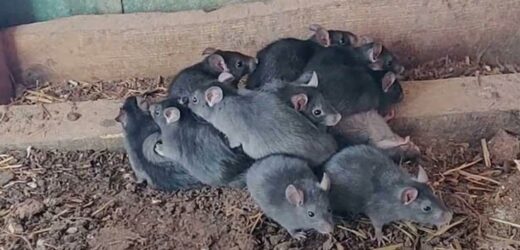A chilling “rat king” that many believe to be an omen of an impending plague has been filmed lurking in a chicken coop.
The “extremely rare” phenomenon occurs when a number of rats get their tails tangled together, leaving them unable to free themselves.
Footage captured by Johan Uibopuu shows the moment he walked into his mum’s chicken coop in Tartu, Estonia and was confronted by the haunting sight.
More than a dozen of the rodents are seen crawling over each other’s bodies trying to escape.
But their efforts are futile and are unable to untie themselves.
“I was making the most of a quiet morning in Tartu when my mother phoned me, sounding quite upset,” Johan explained.
“She had gone to feed the birds at the chicken coop when she saw a bundle of rats right at the entrance as she opened the door.
“When the shock wore off, she went to investigate and tried to remove them from her way, but they were firmly stuck to the ground.”
According to superstition, their occurrence is a sign an imminent plague.
And Johan’s mother had found 13 of the rodents tangled up – an ominous number.
But the sight is even more ominous for the poor rats stuck together.
Andrei Miljutin, whose Natural History Museum at the University of Tartu agreed to take them away, said rodents are “sentenced to death” when they get caught in a rat king.
He said two of the 13 rats were already dead.
“Even if they manage to escape from the narrow burrow, they can’t move around normally, can’t move to find food, and are completely unprotected,” Andrei continued.
“Their survival depends on concrete circumstances – usually they survive until the first encounter with a cat, dog or human.”
Veterinarian Johan said the food, water and bedding supply within chicken coops make it the “perfect place” for rats.
Dr Miljutin said that rat kings seemed to be an “extremely rare phenomenon” with only 60 cases in almost 500 years of recorded history.
To end the suffering of the rats, the museum decided to euthanise them after amputating their tails.
The specimen will now be kept at the museum.
Keep up to date with all the latest news by signing up to one of our free newsletters here.
Source: Read Full Article





